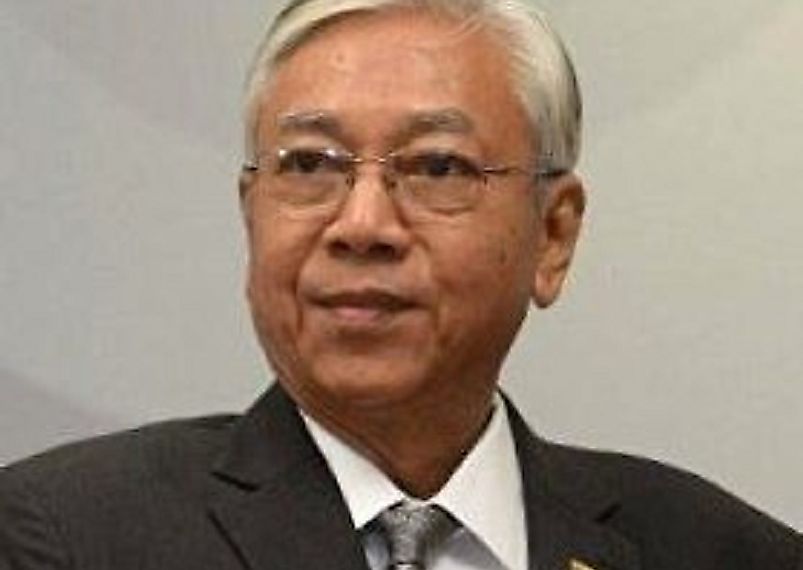Presidents Of Myanmar (Burma)

Myanmar was ruled by the British before attaining self-rule in 1948. Myanmar has seen decades of political instability owing to political and ethnic conflicts that started from the pre-independence period and was carried on through years of self-governance. Myanmar has had eleven presidents in a span of more than 60 years. The presidents have had a great deal of influence on the economic, social and political life of the country.
Presidents Of Myanmar (Burma)
History of the Burmese Presidency
Myanmar had its first president in 1948 after the country gained independence from the British. The first President, Sao Shwe Thaik, who was in office from 1948 until 1952, was succeeded by Ba U. In 1957 Win Maung was appointed the president by the prime minister. After a five-year term, Win Maung was ousted in a military coup staged by Ne Win who took over office from 1962-1981. After resigning from his post due to public unrest, he was succeeded by San Yu who ruled the Socialist Republic of the Union of Burma up to 1988 when he retired. Sein Lwin and Maung Maung ruled for short periods of unrest in 1988. From 1988 until 2011, the country was governed by military rule under military chairmen. These chairmen were Saw Maung, who led the country from 1988 until 1992, and Than Shwe, who was in power from 1992 until 2011. Than Shwe stepped down from the military and presidency giving room for parliamentary elections under the constitution of 2008 whose endorsement he oversaw. Thein Sein succeeded him in 2011 and ruled for five years bringing a lot of reforms to the country. In 2016, Htin Kyaw was elected president and his contributions to the people of Burma are yet to be seen.
Duties of the President of Myanmar
According to the constitution of Myanmar, the president is the head of state and of the government, and leads the executive branch and the cabinet. As the head of the executive branch, the president has the mandate to allocate government ministries as necessary. However, he allocates ministries with the approval of the Pyidaungsu Hluttaw. The selected ministers and their assistants have to meet the qualifications stipulated in the constitution. The president is also charged with the responsibility of ordering the resignation of a minister who has failed to perform their duties. The president is to appoint an Attorney General of his choice from the Hluttaw representatives provided the designated person meets the qualifications.
Sao Shwe Thaik
Sao Shwe Thaik was the first president of Myanmar (Burma). He was born in 1894 and died on November 21, 1962. He was the first president of the Union of Burma. He became the president of the country from 1948 to 1952. Thaik joined the British military service during the WW I, and also served on the Northeast Frontier Service from 1920 until 1923 before entering politics.
Ne Win
Ne Win was one of thirty leading comrades who pushed for independence from the British. He joined the independence movement and was appointed a general of the movements’ army. He was trained in Japan. He acceded to the Burma Independence Army and became an officer working with the Japanese before the latter breached their agreement after which he helped to form a resistance group that saw the Japanese driven out of the country. When Burma gained independence, he was appointed as the chief of general staff and supreme commander of the armed forces. He temporarily took over as the prime minister in 1958 when there were ethnic disputes. While in the office, he managed to bring order in the country and organized the general election in 1960 which saw the reelection of Nu as the prime minister. He led a coup in 1962 to oust Ba U from power. In 1974, he led another coup and took over from Win Maung as the president. He established a dictatorial, socialist, and isolationist state which saw the decline of the economy of Burma making it one of the poorest nation in the world. His policies sparked social unrest and finally resigned from office in 1988 though there are claims that he still maintained control of the affairs of the state until 2002 when he was put under house arrest and died later that year.
Thein Sein
Sein was the first president of Myanmar to be elected to office in a democratic election. Under his rule, the people of Burma have enjoyed their formerly suppressed rights and the political prisoners released. Sein initiated peace talks with conflicting ethnic groups of Burma. Media freedom was also a feature of his five-year term in office. Thein Sein has set the pace for the future growth of Myanmar. Thein Sein has rescued the people of Burma from a life of misery and silent suffering to one of open communication and flourishing economic growth.
Significance of the Presidency in the Government of Myanmar
The current president of Myanmar, Htin Kyaw, spoke of compliance with the constitution during his swearing in, actions which hopefully will uphold the democracy of Myanmar as well the dignity of the people. On April 6, 2016, President Htin signed a parliamentary bill creating the position of a State Counselor who serves an equivalent term as the president. The position is similar to Prime Minister and acts as the link between the executive branch, parliament, and the chief executive.
Presidents Of Myanmar (Burma)
| Presidents of Myanmar (Burma) | Term in Office |
|---|---|
| Sao Shwe Thaik | 1948-1952 |
| Ba U | 1952-1957 |
| Win Maung | 1957-1962 |
| Ne Win | 1962-1981 |
| San Yu | 1981-1988 |
| Sein Lwin | 1988 |
| Maung Maung | 1988 |
| Senior General Saw Maung (Military Rule Chairman) | 1988-1992 |
| Senior General Than Shwe (Military Rule Chairman) | 1992-2011 |
| Thein Sein | 2011-2016 |
| Htin Kyaw (Incumbent) | 2016-Present |







